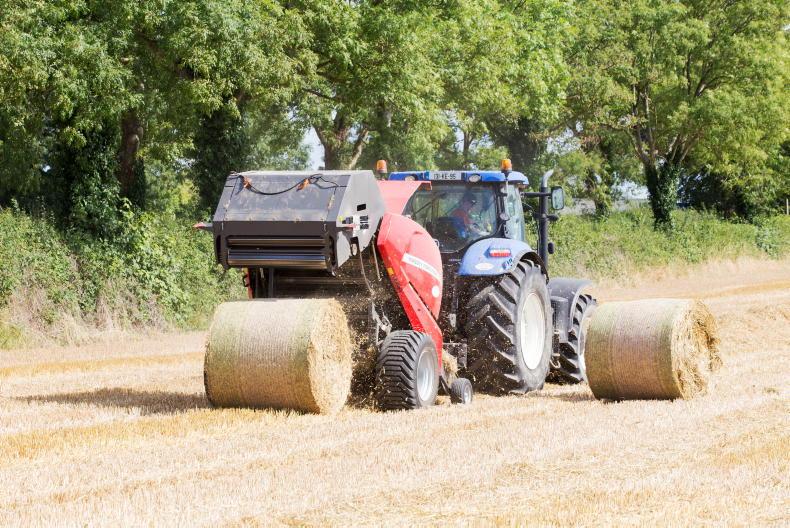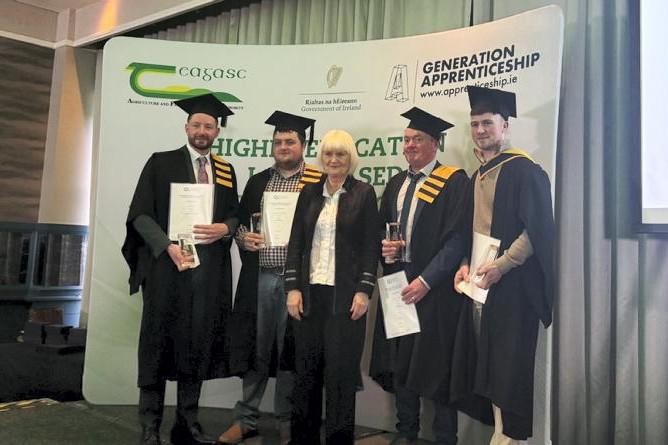View of the sector
Crop production underpins the agri-food industry through the provision of high-quality, low carbon footprint, traceable livestock feed for dairy, beef, horse, poultry and pig production, and raw material for processing into food and drink products.
The national tillage area increased by 19,791ha (6.1%) in 2022 compared with 2021, according to provisional figures from the Department of Agriculture, Food and the Marine (DAFM).
According to the Teagasc National Farm Survey results published in September 2022, the average income on tillage farms rose by over €25,000 to nearly €59,000 in 2021, with a further significant improvement expected for 2022. Relative to other sectors, these figures show that it can be a prosperous sector to work in.
Business & Technology Advisor Tillage, Teagasc

Growing up on a tillage farm in Co Kilkenny, Eoin always knew what he wanted to do.
“I was lucky in a way, I was certain I wanted to go down the agriculture route. It was just a matter of where I was going to end up.”
Eoin studied agriculture at
Waterford Institute of Technology (WIT) [now South East Technological University (SETU)]. After completing his Level 7 course, he then went on to complete a Level 8 add-on in land management. After graduating in 2017 and “by sheer luck,” he fell into a summer job with Seedtech in Co. Waterford, stating, “Until then, I had no specific crop experience.”
During this four-month summer job, Eoin discovered opportunities in the industry which he felt hadn’t been made clear in college.
Eoin had always wanted to work for Teagasc, “But getting a foothold in the organisation is difficult.” He got his opportunity through the Walsh Scholarship programme, which he started in September, 2017.
“I was very fortunate when I applied,” he says. “I got placed in the Enniscorthy office and my mentor was a tillage advisor.”
This put Eoin in the heart of the tillage industry and gave him the extra training he felt he needed in terms of crop knowledge and the wider industry.
In the summer of 2018, Eoin became a malting barley advisor to the Malting Barley Joint Programme?. This joint initiative delivered by Teagasc in conjunction with Boortmalt was developed with the overall aim of making malting barley the most profitable cereal crop on Irish farms. This programme was initially meant to be three years in duration but got extended for a further three years. He worked on a contract basis and explains, “To get a permanent tillage job in Teagasc is quite hard.”
Luckily for Eoin, a permanent position became available as a tillage advisor in the Wicklow region last November, where he is currently working with 150 farmers.
As part of his job, Eoin looks at crops for several different farmers and advises them on nutrition, plant protection, financial analysis and other areas. He enjoys his job as it involves the full cycle of growing crops.
“That’s what appeals to me,” he says. “I prefer to be impartial when it comes to giving advice.”
Teamwork approach
Eoin advises anyone looking to work in tillage that there are many different avenues one can take.
“From advisory to research or selling chemicals; the sector is quite tightly knit. There is a teamwork approach when it comes to helping farmers and you might not get that in every industry.”
Tillage farmer and Crop Science technician, Teagasc

David Kelly, crop science technician at Teagasc.
David is a third-generation tillage farmer working alongside his father and uncles on their family farm in Athy. He tells Irish Country Living that with the large variety of crops grown on their farm, “It was inevitable I was going to pick up an interest along the way.”
David completed a Level 8 degree in Farm Management and Agribusiness on the Wexford campus of Institute of Technology, Carlow [now SETU] and couldn’t recommend the course enough.
“I undertook the core modules - like in every ag science degree - but we also did a lot of business modules. We received huge exposure to both the practical side of agriculture and the business side.”
After graduating during the peak of COVID-19 in 2020, David was fortunate enough to work on his family farm; replicating what he learnt in the classroom and applying it in a practical way.
He then got a job with Eurofins Agriscience working on the development of plant protection products.
“Before starting at Eurofins, I hadn’t much exposure to potatoes [for example],” he says. “It was great to get that exposure to different crops.”
In January 2022, David successfully applied for a crop science technician vacancy in Teagasc. In his role, he carries out the technical work on experiments. “At this time of the year there isn’t much happening in field trials, but we have a wide variety of trials going on in the lab and glasshouse.”
It’s a very challenging time in the tillage sector currently, David explains, “With the loss of chemistry, grassweed problems [like black grass], market price volatility and increased input costs.”
However, there are also huge opportunities coming as part of Crops 2030 [which is a strategic plan to deliver environmental and economic sustainability for the Irish Crops Sector]. Developing high-value markets and the potential of plant protein as an ingredient poses huge opportunities for the tillage sector. David emphasises, “It’s a very exciting time to be in research. It’s great to be at the cutting edge of this [development work] and this is great to see from a farmer’s viewpoint, too.”
Advice for entering
the sector
For anyone coming out of college or wanting to go into the sector, David has the following advice: “Firstly, endeavour to be the best version of yourself and tackle all challenges as best you can. Secondly, get involved in groups and get out on crop walks -- there are great researchers and advisors in the sector. Having the willingness to upskill in the tillage sector is important, as you are never finished learning.”
Head of Crop Knowledge Transfer Department, Teagasc

From a tillage farm in South Kildare, Michael Hennessy always had a keen interest in the practical side of crops. After completing a B.Agr.Sc degree at the University of Essex, Michael took a year out to travel in Australia. On return to Ireland, he worked at Brophy Agri Services for six years as a technical representative.
In 2002, Michael joined Teagasc, initially as a tillage advisor in Tullow before moving into an arable specialist role in Kildalton. He explains, “The specialist role is about the intersection between research and advisory. The major role there is training the industry and advisors in the latest research and how to put it into a strategy that can work for farmers.”
Michael was promoted to head of crops and energy knowledge transfer, where he manages a team of specialists. “This role involves co-ordinating the industry in a larger capacity, bringing stakeholders together and supporting the overall industry from a knowledge transfer point of view.”
The tillage industry is relatively specialised and very technical, with many supports for farmers through advisors and technical reps. With an increase in demand for plant-based foods, Michael adds, “We need to try and grow more products in Ireland to support the food sector.”
Prospects in the industry
Michael emphasises the future for the industry is bright.
“In the Climate Action Plan, the Government has identified tillage as one of the solutions for climate change due to its low carbon output. There is a target to bring tillage up to 400,000 hectares.”
There is an immediate and ongoing demand for agronomists in Ireland, Michael explains, as well as in research. “It’s brilliant for any student to have the breadth of knowledge to deal with both tillage and livestock.
Read more
Footprint Farms: focus on premium crops in Waterford
The roadmap to college
View of the sector
Crop production underpins the agri-food industry through the provision of high-quality, low carbon footprint, traceable livestock feed for dairy, beef, horse, poultry and pig production, and raw material for processing into food and drink products.
The national tillage area increased by 19,791ha (6.1%) in 2022 compared with 2021, according to provisional figures from the Department of Agriculture, Food and the Marine (DAFM).
According to the Teagasc National Farm Survey results published in September 2022, the average income on tillage farms rose by over €25,000 to nearly €59,000 in 2021, with a further significant improvement expected for 2022. Relative to other sectors, these figures show that it can be a prosperous sector to work in.
Business & Technology Advisor Tillage, Teagasc

Growing up on a tillage farm in Co Kilkenny, Eoin always knew what he wanted to do.
“I was lucky in a way, I was certain I wanted to go down the agriculture route. It was just a matter of where I was going to end up.”
Eoin studied agriculture at
Waterford Institute of Technology (WIT) [now South East Technological University (SETU)]. After completing his Level 7 course, he then went on to complete a Level 8 add-on in land management. After graduating in 2017 and “by sheer luck,” he fell into a summer job with Seedtech in Co. Waterford, stating, “Until then, I had no specific crop experience.”
During this four-month summer job, Eoin discovered opportunities in the industry which he felt hadn’t been made clear in college.
Eoin had always wanted to work for Teagasc, “But getting a foothold in the organisation is difficult.” He got his opportunity through the Walsh Scholarship programme, which he started in September, 2017.
“I was very fortunate when I applied,” he says. “I got placed in the Enniscorthy office and my mentor was a tillage advisor.”
This put Eoin in the heart of the tillage industry and gave him the extra training he felt he needed in terms of crop knowledge and the wider industry.
In the summer of 2018, Eoin became a malting barley advisor to the Malting Barley Joint Programme?. This joint initiative delivered by Teagasc in conjunction with Boortmalt was developed with the overall aim of making malting barley the most profitable cereal crop on Irish farms. This programme was initially meant to be three years in duration but got extended for a further three years. He worked on a contract basis and explains, “To get a permanent tillage job in Teagasc is quite hard.”
Luckily for Eoin, a permanent position became available as a tillage advisor in the Wicklow region last November, where he is currently working with 150 farmers.
As part of his job, Eoin looks at crops for several different farmers and advises them on nutrition, plant protection, financial analysis and other areas. He enjoys his job as it involves the full cycle of growing crops.
“That’s what appeals to me,” he says. “I prefer to be impartial when it comes to giving advice.”
Teamwork approach
Eoin advises anyone looking to work in tillage that there are many different avenues one can take.
“From advisory to research or selling chemicals; the sector is quite tightly knit. There is a teamwork approach when it comes to helping farmers and you might not get that in every industry.”
Tillage farmer and Crop Science technician, Teagasc

David Kelly, crop science technician at Teagasc.
David is a third-generation tillage farmer working alongside his father and uncles on their family farm in Athy. He tells Irish Country Living that with the large variety of crops grown on their farm, “It was inevitable I was going to pick up an interest along the way.”
David completed a Level 8 degree in Farm Management and Agribusiness on the Wexford campus of Institute of Technology, Carlow [now SETU] and couldn’t recommend the course enough.
“I undertook the core modules - like in every ag science degree - but we also did a lot of business modules. We received huge exposure to both the practical side of agriculture and the business side.”
After graduating during the peak of COVID-19 in 2020, David was fortunate enough to work on his family farm; replicating what he learnt in the classroom and applying it in a practical way.
He then got a job with Eurofins Agriscience working on the development of plant protection products.
“Before starting at Eurofins, I hadn’t much exposure to potatoes [for example],” he says. “It was great to get that exposure to different crops.”
In January 2022, David successfully applied for a crop science technician vacancy in Teagasc. In his role, he carries out the technical work on experiments. “At this time of the year there isn’t much happening in field trials, but we have a wide variety of trials going on in the lab and glasshouse.”
It’s a very challenging time in the tillage sector currently, David explains, “With the loss of chemistry, grassweed problems [like black grass], market price volatility and increased input costs.”
However, there are also huge opportunities coming as part of Crops 2030 [which is a strategic plan to deliver environmental and economic sustainability for the Irish Crops Sector]. Developing high-value markets and the potential of plant protein as an ingredient poses huge opportunities for the tillage sector. David emphasises, “It’s a very exciting time to be in research. It’s great to be at the cutting edge of this [development work] and this is great to see from a farmer’s viewpoint, too.”
Advice for entering
the sector
For anyone coming out of college or wanting to go into the sector, David has the following advice: “Firstly, endeavour to be the best version of yourself and tackle all challenges as best you can. Secondly, get involved in groups and get out on crop walks -- there are great researchers and advisors in the sector. Having the willingness to upskill in the tillage sector is important, as you are never finished learning.”
Head of Crop Knowledge Transfer Department, Teagasc

From a tillage farm in South Kildare, Michael Hennessy always had a keen interest in the practical side of crops. After completing a B.Agr.Sc degree at the University of Essex, Michael took a year out to travel in Australia. On return to Ireland, he worked at Brophy Agri Services for six years as a technical representative.
In 2002, Michael joined Teagasc, initially as a tillage advisor in Tullow before moving into an arable specialist role in Kildalton. He explains, “The specialist role is about the intersection between research and advisory. The major role there is training the industry and advisors in the latest research and how to put it into a strategy that can work for farmers.”
Michael was promoted to head of crops and energy knowledge transfer, where he manages a team of specialists. “This role involves co-ordinating the industry in a larger capacity, bringing stakeholders together and supporting the overall industry from a knowledge transfer point of view.”
The tillage industry is relatively specialised and very technical, with many supports for farmers through advisors and technical reps. With an increase in demand for plant-based foods, Michael adds, “We need to try and grow more products in Ireland to support the food sector.”
Prospects in the industry
Michael emphasises the future for the industry is bright.
“In the Climate Action Plan, the Government has identified tillage as one of the solutions for climate change due to its low carbon output. There is a target to bring tillage up to 400,000 hectares.”
There is an immediate and ongoing demand for agronomists in Ireland, Michael explains, as well as in research. “It’s brilliant for any student to have the breadth of knowledge to deal with both tillage and livestock.
Read more
Footprint Farms: focus on premium crops in Waterford
The roadmap to college








![George Lamb: ‘we have to find the sweet spot [in agriculture]’](https://s3-eu-west-1.amazonaws.com/ifj/WEBFILES/000/867/584/2372033-867584.jpg)



SHARING OPTIONS